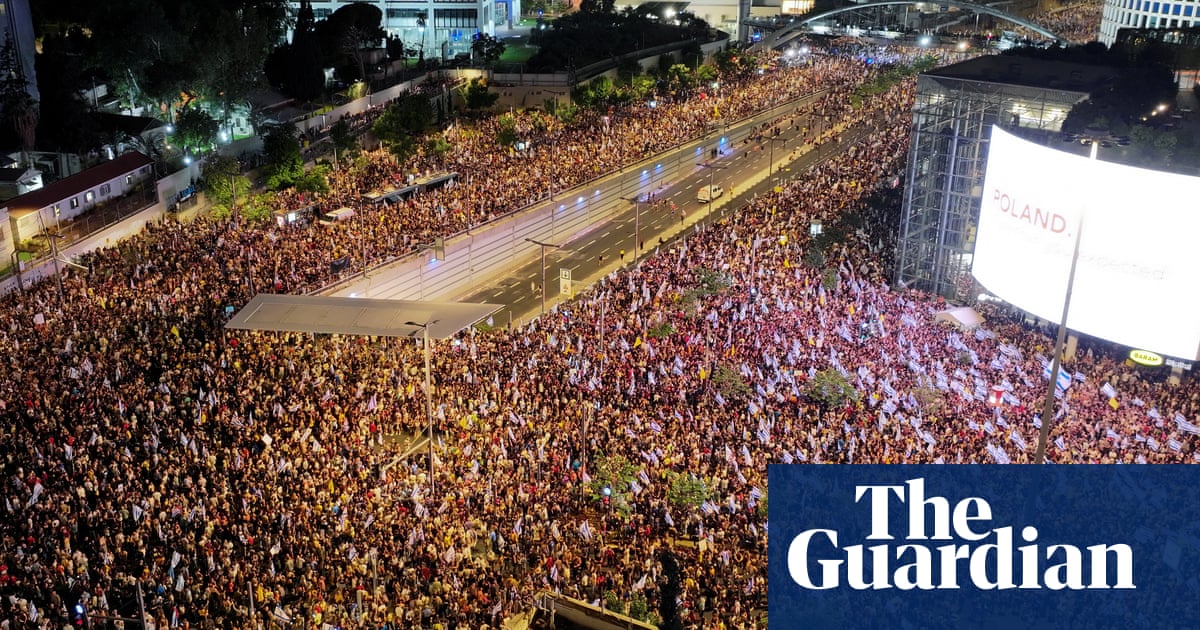Israel is braced for its first nationwide general strike since the Hamas attacks of 7 October, amid widespread public anger at the government’s handling of the war in Gaza after the discovery of the bodies of six hostages at the weekend.
Israel’s largest trade union, Histadrut, ordered a nationwide general strike from 6am on Monday that is expected to bring large parts of the economy to a halt. Government and municipal offices were due to close, as well as schools and many private businesses. Israel’s international airport, Ben Gurion, is due to shut down at 8am local time (0600 BST) for an unknown period.
Histadrut chair Arnon Bar-David said in a statement: “I have come to the conclusion that only our intervention can shake those who need to be shaken.
“A deal is not progressing due to political considerations and this is unacceptable.”
The mayors of Tel Aviv and nearby Givatayim announced that the municipalities would be striking on Monday to demand the return of the hostages, and more are expected to follow suit.
The action comes after tens of thousands of Israelis took to the streets on Sunday night, cutting off the Ayalon highway, the motorway running through the heart of Tel Aviv and lighting fires in the streets. A few dozen police officers tried to contain the protest but were unable to push it back.
The union called the strike after campaign group the Hostages and Missing Families Forum backed the idea in order to force the government to reach a deal for the return of the remaining hostages taken during Hamas’ attacks on 7 October. Israel’s opposition leader, Yair Lapid, also supported the move.
“Were it not for the delays, sabotage and excuses” in months of mediation efforts, the six hostages “would likely still be alive”, a statement from the group said, referring to the discovery of Carmel Gat, Hersh Goldberg-Polin, Eden Yerushalmi, Alexander Lobanov, Almog Sarusi and Ori Danino in tunnels “dozens of metres” underground during fighting in Rafah, southern Ga za.
The strike will mean Tel Aviv airport, the only major route in and out of the country, will be closed. It could also affect hospitals and other public services, costing the economy millions of shekels.
On Sunday, Israeli media reported the attorney general Gali Baharav-Miara had instructed prosecutors to seek an injunction against the strike. Israel’s far-right finance minister, Bezalel Smotrich, wrote to the attorney general on Sunday seeking an injunction, arguing that it would harm the economy and had no legal basis as its main aim was to influence government policy on state security.
The Histadrut union has not taken such drastic action since March 2023, when Netanyahu tried to fire defence minister Yoav Gallant over his opposition to the government’s controversial judicial overhaul plans.
Military spokesperson Daniel Hagari said all six hostages “were abducted alive on the morning of 7 October” and “brutally murdered by Hamas terrorists shortly before we reached them”.
However, the findings pointing to Hamas executions did little to deflect widespread fury towards Benjamin Netanyahu and his rightwing coalition for failing to agree a US-backed hostages-for-peace deal with Hamas, which has been on the negotiating table since late May. The longtime Israeli leader has been repeatedly accused of stalling on a ceasefire deal for his own political gain.
On Sunday, Netanyahu asked hostage Lobanov’s parents for “forgiveness for not succeeding in bringing Sasha back alive”.
Some analysts said the public outcry over the six hostages who died could signal a new level of political pressure on Netanyahu. “I think this is an earthquake. This isn’t just one more step in the war,” said Nomi Bar-Yaacov, associate fellow in the International Security Program at Chatham House, shortly before Sunday’s protests.
US President Joe Biden said he was “devastated and outraged” by the hostage deaths, but told reporters he was “still optimistic” a deal could be reached.
With Agence France-Presse and Associated Press

